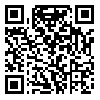جلد 9، شماره 43 - ( پاییز و زمستان 1400 )
شماره 43 صفحات 181-167 |
برگشت به فهرست نسخه ها
Research code: A-10-2463-1
Download citation:
BibTeX | RIS | EndNote | Medlars | ProCite | Reference Manager | RefWorks
Send citation to:



BibTeX | RIS | EndNote | Medlars | ProCite | Reference Manager | RefWorks
Send citation to:
akbarzadeh Z, fallah V, rasoli E. The neglected null dimensions of the curriculum obtained in the field of educational sciences from the point of view of new scholars of Farhangian University (A phenomenal study). erj 2021; 9 (43) : 7
URL: http://erj.khu.ac.ir/article-1-811-fa.html
URL: http://erj.khu.ac.ir/article-1-811-fa.html
اکبرزاده زهرا، فلاح وحید، رسولی سیده عصمت. پدیدارشناسی ابعاد مغفول برنامه درسی کسب شده رشته علوم تربیتی از نگاه نومعلمان دانشگاه فرهنگیان. پژوهش های تربیتی. 1400; 9 (43) :167-181
زهرا اکبرزاده*1 
 ، وحید فلاح2
، وحید فلاح2 
 ، سیده عصمت رسولی2
، سیده عصمت رسولی2 


 ، وحید فلاح2
، وحید فلاح2 
 ، سیده عصمت رسولی2
، سیده عصمت رسولی2 

1- دانشگاه آزاد اسلامی ساری ، zakbarzadeh53@gmail.com
2- دانشگاه آزاد اسلامی ساری
2- دانشگاه آزاد اسلامی ساری
چکیده: (9585 مشاهده)
این پژوهش با هدف شناسایی ابعاد مغفول برنامه درسی کسب شده رشته علوم تربیتی دانشگاه فرهنگیان انجام شده است رویکرد پژوهش حاضر،کیفی ازنوع پدیدارشناسی بوده که جامعه آماری آنرا را نومعلمان رشته علوم تربیتی(آموزش ابتدایی)دانشگاه فرهنگیان درسال تحصیلی 1399-1398 تشکیل دادند. نمونهگیری به صورت هدفمند تا اشباع نظری ادامه یافت. در این پژوهش تعداد شرکتکنندگان 16نفر (6مرد و10زن) از نومعلمان بودند. جهت جمع آوری اطلاعات از مصاحبه عمیق نیمه ساختار و برای تجزیه و تحلیل دادهها از روش هفتمرحله کلایزی استفاده شد. یافتههای این پژوهش درنهایت درقالب 7 بعد، شامل (عدم آموزش کاربردی سند تحول بنیادین، عدم کسب هویت حرفهای اسلامی معلم، عدم کسب چگونگی پرورش خلاقیت، عدم کسب دانش محتوایی، عدم کسب دانش پداگوژیک، عدم کسب دانش جامعهشناسی، عدم کسب دانش روانشناسی اسلامی، عدم کسب هنر اکلکتیک) و23 مولفه، درنهایت در قالب یک نقشه مفهومی ارائه شد. توجه به این نقشه مفهومی میتواند برای دستاندرکاران برنامه درسی رشته علوم تربیتی نقطه تاملی برای باز اندیشی برنامه درسی دانشگاه فرهنگیان باشد.
شمارهی مقاله: 7
واژههای کلیدی: برنامه درسی کسب شده، دانشگاه فرهنگیان، برنامه درسی مغفول، برنامه درسی مغفول پنهان کسب شده
نوع مطالعه: مقاله پژوهشی |
موضوع مقاله:
برنامه ریزی آموزشی
دریافت: 1399/2/7 | ویرایش نهایی: 1402/8/30 | پذیرش: 1401/1/30 | انتشار الکترونیک: 1401/2/11
دریافت: 1399/2/7 | ویرایش نهایی: 1402/8/30 | پذیرش: 1401/1/30 | انتشار الکترونیک: 1401/2/11
فهرست منابع
1. Alemu, M., Kind, Vanessa , M., Basheh, Kassa Michael, Mulugeta Atnafu, Per Kind & Taha, Rajab(2019). The knowledge gap between intended and attained curriculum in Ethiopian teacher education: identifying challenges for future development. A Journal of Comparative and International Education Published Online: 08 Apr. [DOI:10.1080/03057925.2019.1593107]
2. Burkhardt, H. (2014). Curriculum Design and Systemic Change. In: Li Y, Lappan G. (eds) Mathematics Curriculum in School Education. Advances in Mathematics Education. Springer, Dordrecht. [DOI:10.1007/978-94-007-7560-2_2]
3. Carracedo, Fermín Sánchez. Soler, Antonia & Carme Martín & David López & Alicia Ageno & Jose Cabré & Jordi Garcia & Joan Aranda & Karina Gibert. (2018). Competency Maps: an Effective odel to Integrate Professional Competencies Across a STEM Curriculum. Journal of Science Education and Technology, 27,448-46 [DOI:10.1007/s10956-018-9735-3]
4. Chapman, G. and Tunmer, J. (2013); The effects of mental comprehension strategies in learning disabled student. Journal of Learning Disabilities, 18: 111-122.
5. Craig Kridel(2010)، Encyclopedia of Curriculum Studies. [DOI:10.4135/9781412958806]
6. Cohen, L. & Manion, L. (1986), Research Methods in Education. London, Routledge.
7. Day, Christopher, & Kington, Alison. (2008). Identity, well‐being and effectiveness: the emotional contexts of teaching. Pedagogy, Culture & Society, 16(1), 7-23. Doi: 10.1080/14681360701877743. [DOI:10.1080/14681360701877743]
8. Darling-Hammond, L., & Rothman, R. (Eds.) (2011). Teacher and leader effectiveness in high-performing education systems. Washington, DC: Alliance for Excellent Education and Stanford, CA: Stanford Center for Opportunity Policy in Education.
9. Eisner،E.W.(1994).The Educational Imagination:Ondesign and evaluation of school programs.(3 rd.ed)New York:Macmillan
10. Espinoza, C., Mardones, C., Sáez, K., & Catalán, P. (2019). Entrepreneurship and regional dynamics: the case of Chile. Entrepreneurship & Regional Development, 31(9-10), 755-767. [DOI:10.1080/08985626.2019.1565421]
11. EISNER, E,.( 1985)W. The Educational Imagination: On the Design and Evaluation of School Programs. New York: Macmillan Publishing Co., second edition
12. Encyclopedia of Curriculum studies (2010). Craig kridel, Copyright by SAGE Publications, Inc.
13. Flinders, David J., Noddings Nel and Thornton, Stephen J. (1986). The Null curriculum: Its Theoretical Basis. Curriculum Inquiry, Vol.16, No. 1(spring, 1986), pp.33-42. [DOI:10.1080/03626784.1986.11075989]
14. Glatthorn, A. A., Boschee, F., & Whitehead, B. M. (2016). Curriculum leadership, fourth Edition, printed in he united states of America.
15. Ginns, P., Kitay, J., & Prosser, M. (2010) Transfer of academic staff learning in a research-intensive University. Teaching in Higher Education, 15 (3), 235-246. [DOI:10.1080/13562511003740783]
16. Gillham, B. (2000), The Research Interview, London, Rautledge.
17. Glatthorn, A. et.al (2005). Curriculum Leadership: Strategies for development and implementation. Los Angeles & London: SAGE Publications, Inc
18. Harriet Able, Jocelyn Glazier, Ritsa Mallous, Ashley Boyd, Kristen Bell-Hughes & Deborah Eaker-Rich.Reconnect (2018)and Recharge: Plugging New Teachers into Support Outlets.Action in Teacher Education, Volume 40, - Issue 2.Published Online: 10 Apr 2018). [DOI:10.1080/01626620.2018.1424048]
19. Pasandide, A. Tavakkoli, M, Kazazi N و The Mediating Role of Gratefulness in the Relationship between Desires and Satisfaction and Its Islamic-Psychological Explanation, Positive Psychology Research, Vol. 6, No. 3, 2020.
20. Tunmer, W. E &. Chapman . J. W .A Longitudinal Investigation of the Influence of Literacy-related Skills, Reading Self-perceptions, and Inattentive Behaviours on the Development of Literacy Learning Difficulties. Volume 60, 2013 - Issue 3 [DOI:10.1080/1034912X.2013.812188]
ارسال پیام به نویسنده مسئول
| بازنشر اطلاعات | |
 |
این مقاله تحت شرایط Creative Commons Attribution-NonCommercial 4.0 International License قابل بازنشر است. |



